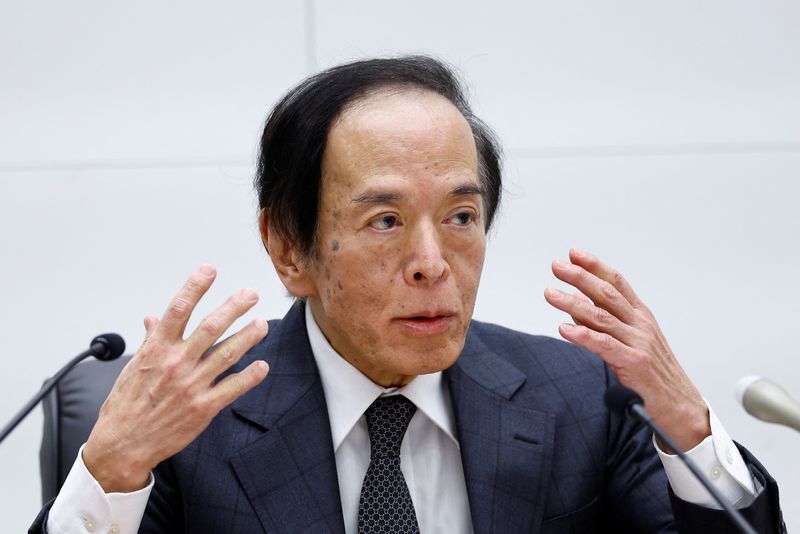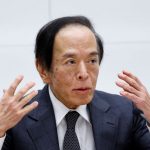TOKYO (Reuters) -The Bank of Japan expects the economy to move closer to sustainably achieving the central bank’s 2% inflation target next year, Governor Kazuo Ueda said on Wednesday, suggesting the timing of its next interest rate increase was nearing.
But he warned of the need to scrutinise the fallout from “high uncertainties” surrounding overseas economies, especially the economic policies of the incoming U.S. administration of President-elect Donald Trump.
The outlook for next year’s wage negotiations between Japanese firms and unions is also key, Ueda said in explaining factors the central bank would scrutinise in setting policy.
“The timing and pace of adjusting the degree of monetary accommodation will depend on developments in economic activity and prices as well as financial conditions going forward,” Ueda said in a speech to business lobby Keidanren.
The remarks underscore the BOJ’s resolve to keep pushing up short-term rates from the current 0.25% next year. Most analysts expect the bank to raise rates to 0.5% in January or March.
The BOJ ended negative interest rates in March and raised its short-term policy target to 0.25% in July. It has signalled a readiness to hike again if wages and prices move as projected.
Consumption has shown signs of improvement as intensifying labour shortages push up wages, Ueda said, stressing progress Japan has made in durably achieving the BOJ’s price target after years of aggressive monetary stimulus.
In the current phase of transition towards achieving 2% inflation in a sustainable manner, the BOJ will support the economy by keeping its policy rate lower that levels neutral to the economy, Ueda said.
But if the economy continues to improve, the BOJ will raise rates, as maintaining excessive monetary support for too long could heighten inflationary risks, he said.
“Our projection is that the virtuous cycle will further intensify and that Japan’s economy will move closer to sustainable and stable 2% inflation, accompanied by wage increases,” Ueda said on the prospects for 2025.
“Prices of a wide range of goods and services have begun to rise moderately recently, reflecting increasing wages. Against this background, we judge that sustainable and stable achievement of our 2% inflation target is now within sight.”
The speech followed remarks Ueda made last week calling for the need to await more information on Trump’s policy stance and domestic wage developments before hiking borrowing costs again.
Those remarks at a press conference after the BOJ kept rates steady, were interpreted by investors as dovish, helping push the yen to its weakest since July and triggering warnings by Japanese authorities.
Japan must see wages rise at levels consistent with 2% inflation, Ueda said on Wednesday, adding that high profits achieved by big firms must be distributed to smaller firms and households for the economy to durably meet the BOJ’s inflation target.
“We will examine how wage hikes by small and midsize firms will evolve, using our network of branches,” Ueda said.

The BOJ will release its quarterly report on regional economic conditions on Jan. 9, which will likely include its view on whether wage hikes are spreading nationwide.
The report will likely be among factors the BOJ’s board will scrutinise for its next policy decision on Jan. 24.
To read the full article, Click Here

